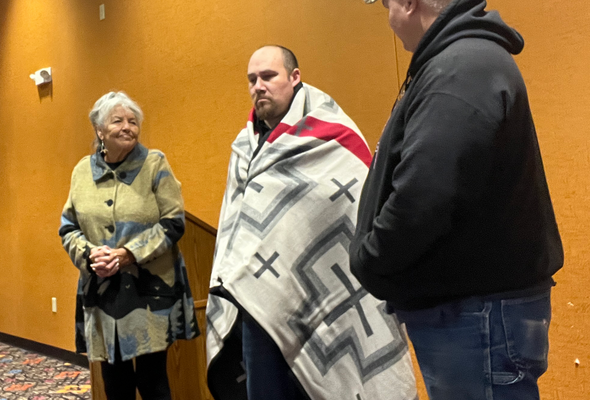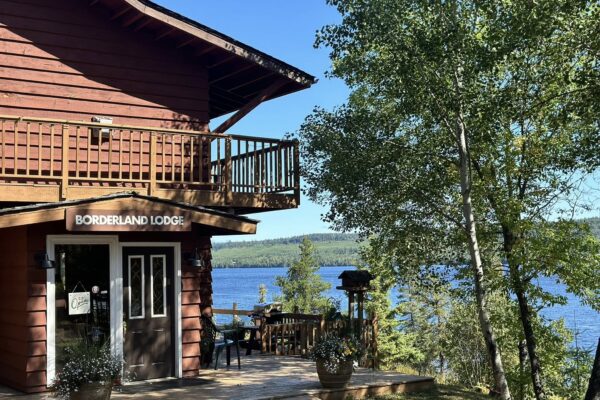Community gardens in Grand Portage show the roots of food sovereignty
It’s nearly impossible to have a garden without getting your hands dirty. And for the coordinator of an award-winning garden on the Grand Portage Reservation, Emily Derke wouldn’t fathom keeping her bare hands out of the dirt.
“I don’t really like wearing garden gloves,” she said. “I feel like I can’t function as well.”
Derke is the agricultural coordinator for the Grand Portage Band of Lake Superior Chippewa. The gardens she helps manage were recently selected as the Cook County 2022 Farm Family of the Year by University of Minnesota Extension. The local UM Extension Committee selected the Grand Portage Community Garden to receive the award this year in recognition of the significant efforts by the program to provide food and agricultural opportunities for the Grand Portage community.
Cook County Extension Educator Sarah Waddle says the committee was inspired by the gardens in Grand Portage.
“We’ve been really impressed and inspired by the work that’s going on in Grand Portage around food sovereignty and self-determination of the food system,” Waddle said. “They have such a wonderful project going on with the community garden growing food.”
The Grand Portage Band has a focus on food sovereignty, which is the inherent right to define its own food system with traditional culture and historical context.
The goal is to provide access to healthy, affordable and sustainable food for all members of the community. WTIP first reported on this about five years ago when the Grand Portage Band formed the Community Agriculture Through Culture, Health and Education (CACHE) project. The focus of the CACHE project nowadays has shifted to food sovereignty, which essentially means harvesting and growing food from the Grand Portage Reservation that is then shared within the community.
At the Mineral Center gardens where Derke primarily works, she is responsible for three hoop houses, a school garden and other land that was recently added to the garden. Originally, the Mineral Center site was a family farmstead. It then became a community garden offering 10 x 12-foot plots to all who wanted to grow. That garden was expanded twice. In the fall of 2012, a 90 x 90-foot school garden was added, followed by the three hoop houses. More recently, a five-acre addition was opened, fenced and brought into production. Derke says that working in the production of local food is an important part of what she does.
“That’s a really neat part of this position and this program is that you’re farming and you’re growing food and then you’re just sharing it,” she said. “We’re down here at the end of the road, just south of the Canadian border. There’s not a lot of food up here. You don’t just run to your grocery store and buy some cheap vegetables whenever you need them. So, to have that access is a huge asset to the community.”
Derke says that in her personal life she tries to eat as much homegrown and wild harvested food as possible.
“And so to be able to participate in that on a community scale and help provide that to a whole community of people is really a special job to be able to contribute to,” she said.
At the Mineral Center location, individual plots are available to tribal members for family production. Emma and Erik Carlson live in Grand Portage and plant crops and various plants at the community garden. She led WTIP’s Joe Friedrichs on a tour of the plot on a recent warm summer day, explaining the benefits of community gardening. (Audio below)
“It’s fun to give away some of what we grow,” she said. “That’s the fun aspect for me, to share everything that we’ve done here.”
Tess Bailey is the nutrition educator for the Grand Portage band’s supplemental nutrition assistance program (SNAP). She says that a community garden can serve as the roots of food sovereignty.
“It gives people that opportunity to control their own food supply,” she said. “And that’s all about food sovereignty. That’s what that whole thing is about. It’s that a community, a group of people, has the right to control their own food system.”
Bailey says the recognition for the Grand Portage gardens from the University of Minnesota Extension Program is great for the community, but also for other parts of the state where the local agriculture scene might not be as visible.
“They now have a broader idea of what their state has to offer. They have a better understanding of us, because hey, they’re farmers. We have farmers, too,” Bailey said. “So it actually kind of helps people understand each other better, and creates a broader community across the state in agriculture. It makes us all the same folks doing the same thing, just in a little different place.”














